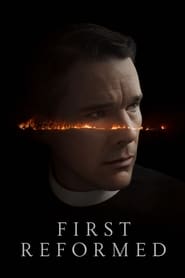First Reformed is not the sort of movie that undersells its metaphors. It bets the house on them, gambling on the possibility that an old-fashioned morality play asking Big Questions about faith, activism, and the futility of trying to save the world will pay off in a moment when even serious American cinema—i.e. films unconcerned with Skywalkers or Infinity Stones—comes at least partially steeped in irony. […] This scenario is serious almost to the point of silliness: It could be parody of a morality play. But the heaviness is also essential to the architecture and impact of what I’m thinking is the year’s first maybe-great American movie. […] First Reformed is made in a refined style but it’s shamelessly melodramatic at its core; like a preacher trying to win over a skeptical congregation. A late sequence where Ernst and the heavily pregnant Mary—a potentially redemptive figure whose name is not just a metaphor but a meta-five—imagine themselves on an airborne vision quest, floating over and through devastated landscapes, is the sort of wild, risky flourish that could easily be mistaken for a mistake. It’s not. Their levitation lifts First Reformed out of its slow, heavy rhythm while simultaneously deepening its melancholy. The film’s mix of austerity and audacity is also its reason for being. First Reformed is filled with leaps of faith for its characters and also its director.
— Adam Nayman (The Ringer)
The church’s gift shop sells one-size-fits-all baseball caps, its attendance is miniscule, and its organ doesn’t work—a metaphor, perhaps, for Toller’s chastity, and for the desire that the reverend tries so hard to expunge and ignore. […] First Reformed is about Schrader’s film theories, about the transcendent possibilities of the medium, as much as it is about religion. […] The final shot, twirling oneirically, the camera jubilant as it circles around Toller and Mary in bloody embracement, feels torn from a Brian De Palma film, out of place with the phlegmatic style of Schrader’s. It suggests a dream, an Empyrean awakening.
— Greg Cwik (Slant Magazine)
Schrader, no proponent of the church, resolves that religious extremism isn’t just about strapping on a suicide vest and walking into a crowd; it’s also about putting so much into one’s faith that, as a consequence, one deprives themselves of love and happiness.
— Brian Eggert (Deep Focus Review)
It’s the main character from Diary of a Country Priest, it’s the setting from Winter Light, it’s the ending from Ordet, it’s the levitation from The Sacrifice, and it’s all wrapped together with the barbed wire of Taxi Driver. It’s a mistake when you think that any of us do anything new. All we do is reassemble our montages. If you reassemble in an interesting enough way, it will become something new.

